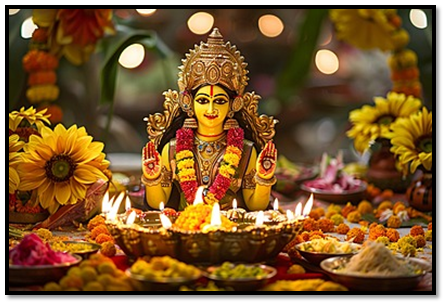Lakshmi Puja: The Festival of Prosperity and Devotion
Lakshmi Puja is one of the most important and widely celebrated festivals in India, especially during the auspicious occasion of Diwali. It is dedicated to Goddess Lakshmi, the Hindu deity of wealth, prosperity, and fortune. This puja is traditionally observed on Amavasya (the new moon day) of the Hindu month of Kartik (October–November), which is considered the most auspicious day to invoke Goddess Lakshmi’s blessings for financial well-being, happiness, and success.
The celebration of Lakshmi Puja is rooted in various Hindu history and legends. One of the most popular legends associated with Lakshmi Puja is the Samudra Manthan or churning of the ocean. According to Hindu mythology, the gods and demons worked together to churn the ocean of milk in search of amrit (the nectar of immortality). During this event, Goddess Lakshmi emerged from the ocean, bringing with her the promise of wealth, prosperity, and good fortune.
Another significant legend tied to Lakshmi Puja is that of Lord Rama. It is believed that on the day of Diwali, Lord Rama returned to Ayodhya after defeating the demon king Ravana and completing his 14-year exile. To celebrate his return, the people of Ayodhya lit oil lamps (diyas) to welcome Lord Rama, and the day became associated with the triumph of light over darkness. Since Diwali celebrates this victory, Lakshmi Puja became an integral part of the festivities, symbolizing prosperity and abundance for the home.
Lakshmi Puja is celebrated to invite the divine blessings of Goddess Lakshmi into homes and businesses. Hindus believe that Goddess Lakshmi visits the cleanest and most illuminated homes on this day, bringing with her prosperity and wealth for the upcoming year. Therefore, households are meticulously cleaned, and doors and windows are decorated with rangolis, flowers, and diyas to welcome the goddess. On this day, devotees pray to Lakshmi for not only material wealth but also spiritual prosperity. Lakshmi Puja is an opportunity to express gratitude for the blessings of the past year and seek blessings for the future. It is also a time to reflect on using wealth responsibly and ensuring that prosperity is used for the benefit of family and society.


Lakshmi Puja is celebrated with grandeur and devotion across India, but the customs may vary slightly from region to region. Here is how the festival is typically observed:
1. Preparations for the Puja: Days before Lakshmi Puja, homes and offices are thoroughly cleaned to rid them of negative energies. De-cluttering the space is symbolic of inviting Goddess Lakshmi into a pure and clean environment. People decorate their homes with flowers, rangoli designs, and string lights or earthen lamps (diyas) to brighten up the surroundings.
2. Setting up the Puja: On the day of Lakshmi Puja, families set up a small altar or mandap in a clean, sacred space in their homes. Idols or pictures of Goddess Lakshmi, along with Lord Ganesha (the remover of obstacles), are placed on the altar. Lord Ganesha is worshiped first as it is believed that his blessings are essential for the successful completion of any endeavor.
3. The Rituals: During the evening, families gather to perform the puja. The rituals involve chanting of mantras, offering flowers, fruits, sweets, and incense to the deities, and reciting the Lakshmi Ashtottara (108 names of Goddess Lakshmi) or Lakshmi Stotra (hymns praising the goddess). Special items used during the puja include kumkum (vermilion), turmeric, betel leaves, rice grains, and gold or silver coins symbolizing wealth.
4. Lighting of Diyas: After the puja, homes are illuminated with oil lamps, symbolizing the victory of light over darkness. Diyas and candles are placed in every corner of the house to dispel ignorance and negative energy. Families often leave the diyas burning throughout the night as a sign of welcoming prosperity and good fortune.
5. Business Worship: In many parts of India, especially in the business community, Lakshmi Puja has a special significance. It is the time when businesses and traders close their old accounts and perform a puja for account books and ledgers, starting fresh for the new financial year. This is called Chopda Pujan in Gujarat and Bahi-Khata Puja in Maharashtra.
6. Exchanging Gifts and Sweets: Diwali and Lakshmi Puja are also occasions for sharing joy with family and friends. People exchange gifts, sweets, and good wishes. Feasts, with traditional delicacies like kaju katli, ladoos, and barfis being prepared and shared, mark the festive atmosphere.
Though Lakshmi Puja is observed across India, the celebration takes on different forms in various regions:
In West Bengal, the day is dedicated to the worship of Kali, known as Kali Puja. However, the significance of wealth and prosperity remains, with many homes also performing Lakshmi Puja.
In Maharashtra, the tradition of Dhanteras, which precedes Lakshmi Puja, is important. On Dhanteras, people purchase gold, silver, and new utensils to symbolize wealth and auspicious beginnings.
In Gujarat, the day following Diwali is celebrated as the Gujarati New Year, and Lakshmi Puja plays a vital role in blessing the business community with prosperity and success.
In Tamil Nadu, Thalai Deepavali is celebrated, particularly for newlyweds, and the day is marked by special pujas and family gatherings.
Lakshmi Puja holds a profound message about the nature and use of wealth in our lives. It reminds us that material wealth should be coupled with spiritual growth and used for good causes. It teaches the value of hard work, honest living, and sharing one’s prosperity with others.
The festival symbolizes the importance of cleansing both physical spaces and inner selves, making room for positive energy and new opportunities. Goddess Lakshmi’s blessings are sought not only for personal gain but for the overall well-being of the family, community, and society.
1. For Spiritual Cleansing: Lakshmi Puja is not only about the pursuit of material wealth but also about spiritual cleansing. The rituals signify the removal of darkness and ignorance, paving the way for a more enlightened and fulfilling life.
2. For Prosperity and Good Fortune: The primary reason for celebrating Lakshmi Puja is to invite wealth and prosperity into one’s home and life. By performing the puja, devotees hope to seek the blessings of the goddess for material success, happiness, and a prosperous year ahead.
3. Strengthening Family Bonds: The celebration brings together families, encouraging shared rituals and joy. It is a time to reconnect with loved ones, exchange gifts, and celebrate the blessings of life together.
4. Cultural Significance: Lakshmi Puja is a part of the broader Diwali festivities, which mark the victory of good over evil, light over darkness, and knowledge over ignorance. Celebrating Lakshmi Puja during Diwali deepens one’s connection to cultural and religious traditions.
Lakshmi Puja is much more than a simple religious ritual — it is a celebration of life, wealth, and spiritual abundance. The festival highlights the importance of maintaining a balance between material prosperity and spiritual well-being. With its beautiful customs, festive atmosphere, and profound message, Lakshmi Puja continues to be a significant festival that brings joy, prosperity, and unity to families and communities across India.
By: Ms.Rachna Saraswat (Assistant Manager – Administration)



